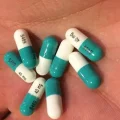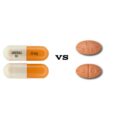A nurse practitioner (NP) is an advanced practice registered nurse and a type of mid-level practitioner. NPs are trained to assess patient needs, order and interpret diagnostic and laboratory tests, diagnose disease, formulate and prescribe treatment plans.
A Nurse Practitioner (NP) either has a Master’s of Science in Nursing (MSN) or a Doctor of Nursing Practice (DNP). They can serve as either a primary or specialty care provider. Nurse Practitioners earn a higher salary, have more responsibility and more career opportunities than many other types of nurses.
What is Adderall?
Adderall is a combination drug containing four salts of amphetamine. The mixture is composed of equal parts racemic amphetamine and dextroamphetamine, which produces a ratio between dextroamphetamine and levoamphetamine, the two enantiomers of amphetamine.
For people diagnosed with attention-deficit hyperactivity disorder (ADHD), Adderall helps to improve concentration and focus. As a central nervous system stimulant, it can also have the very same effects on people without ADHD.
The symptoms of attention deficit hyperactivity disorder (ADHD) can be categorized into 2 types of behavioral problems: inattentiveness, and hyperactivity and impulsiveness.
Most people with ADHD have problems that fall into both these categories, but this is not always the case. For example, some people with the condition may have problems with inattentiveness, but not with hyperactivity or impulsiveness. This form of ADHD is also known as attention deficit disorder (ADD). ADD can sometimes go unnoticed because the symptoms may be less obvious.
If you take Adderall for ADHD, or for other purposes, it’s important to be aware of the side effects. Effects can be positive when Adderall is taken as intended, but for people without ADHD who use the drug without medical supervision, the effects can be dangerous. Learn more about the range of effects this stimulant has on your body.
How Long Does It Take For Adderall To Work?
Although you may experience beneficial effects from stimulants within a few days of starting the medication, it often takes several weeks to get the full effect of the medication. Your healthcare provider may also need to gradually adjust the dose to find the dose that works best for you.
Can A Nurse Practitioner Prescribe Adderall
YES! Nurse practitioners can prescribe Adderall, and other controlled substances, in all 50 states and Washington DC. That said, the degree of independence with which they can prescribe drugs, medical devices (e.g., crutches) or medical services varies by state NP practice authority.
- In 21 states and Washington DC, nurse practitioners have the explicit legal authority to prescribe. The application for prescriptive authority may be separate from NP state credentialing, and NPs prescribing controlled substances generally must register with the DEA.
- In 29 states, NPs can prescribe medication but must have a “collaborative relationship” or “protocol agreement” with a specific, supervising physician. Please note that some of these states (e.g., Vermont, Connecticut, New York) require a probationary period in collaboration with a physician in order to earn full prescriptive authority.
- In all 50 states and Washington DC, nurse practitioners can prescribe controlled substances with the appropriate supervision (i.e., collaborative agreement, if required) and credentialing.
How Should I Take Adderall?
Stimulants are usually taken 1 to 2 times per day with or without food.
- Tablets (Adderall®): Swallow the tablets whole. Chewing the tablets gives an unpleasant taste and can irritate the mouth and throat.
- Sprinkle capsules (Adderall XR®): Swallow whole or sprinkle onto food, such as applesauce or pudding and eat immediately. Do not chew sprinkle capsules or contents.
The dose of stimulant medication is variable. Only your healthcare provider can determine the correct dose for you. Follow the directions on your prescription label carefully, and ask your doctor or pharmacist to explain any part you do not understand. Take Adderall exactly as directed.
What Happens If I Miss A Dose Of Adderall?
If you miss a dose of stimulant, take it as soon as you remember if it is still early in the day. Do not take a missed dose after 5:00 PM, as this may interfere with sleep. Do not take a missed dose of extended-release capsules after 2:00 PM, as this may interfere with sleep. Discuss missed doses with your healthcare provider. Do not double your next dose or take more than what is prescribed.
What Happens If I Overdose With Adderall?
If an overdose occurs call your doctor or 911. You may need urgent medical care. You may also contact the poison control center at 1-800-222-1222.
A specific treatment to reverse the effects of stimulants does not exist.
The possible side effects of Adderall include:
Common side effects
- Upset stomach, loss of appetite, insomnia, and mild anxiety
Rare side Effects
Contact your healthcare provider if any of the following occur while taking stimulants:
- Significant increases in blood pressure or heart rate, shortness of breath, fatigue
- Severe anxiety, panic attacks, mania, hallucinations, paranoia or delusions
- Severe muscle pain, weakness, signs of dehydration, or dark urine
- Prolonged or painful erection
- Changes of feeling or color in your fingers or toes.
Serious side effects
Misuse of amphetamine medications may cause sudden death and serious cardiovascular adverse events. Amphetamine medications should be avoided in individuals who have a heart defect (structural abnormality), uncontrolled high blood pressure, or other disorder of the heart.
Are There Any Risks For Taking Adderall?
Stimulants are Schedule II controlled substances. There is a risk of physical and/or emotional dependence (addiction) when they are taken for long periods of time.
Although treatment with stimulant medications can slow growth, many studies have shown that these changes are small. Children may catch up with growth over time; therefore, it should not be a concern for most children. Height, weight, and eating habits should be discussed before treatment starts and regularly during treatment. If you are concerned about your child’s growth, discuss other possible treatments with your child’s doctor.
Summary Of FDA Black Box Warnings
Sudden Cardiac Death: Misuse of amphetamines may cause sudden death or serious cardiovascular adverse events.
Dependence: Amphetamines have a high potential for abuse. Prolonged use of amphetamines may lead to drug dependence. Particular attention should be paid to the possibility of subjects obtaining amphetamines for non-therapeutic use or distribution to others. They should be prescribed or dispensed sparingly.





